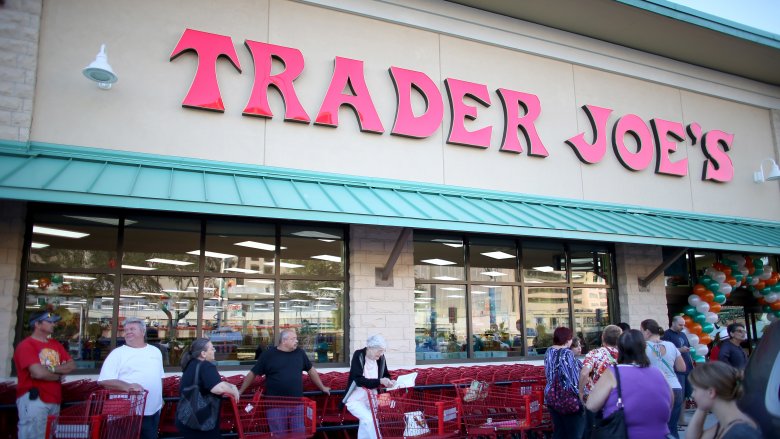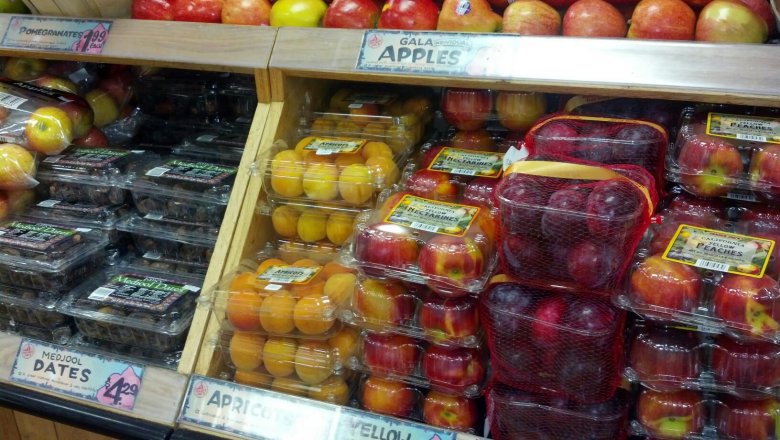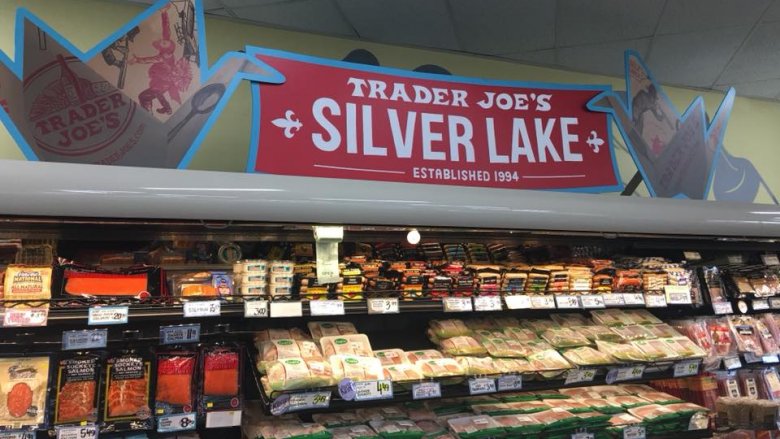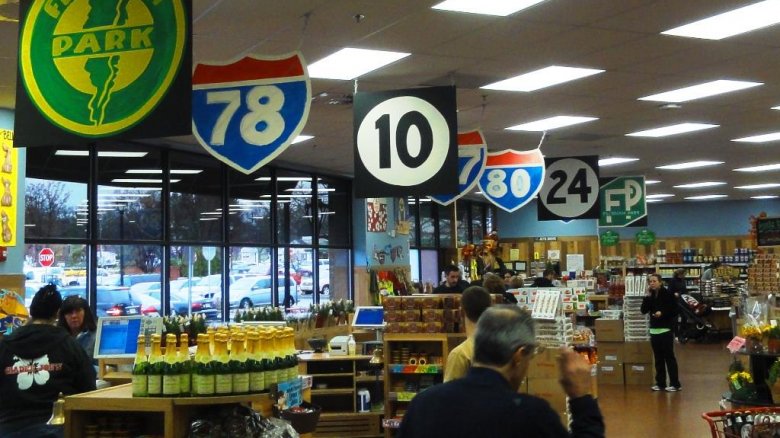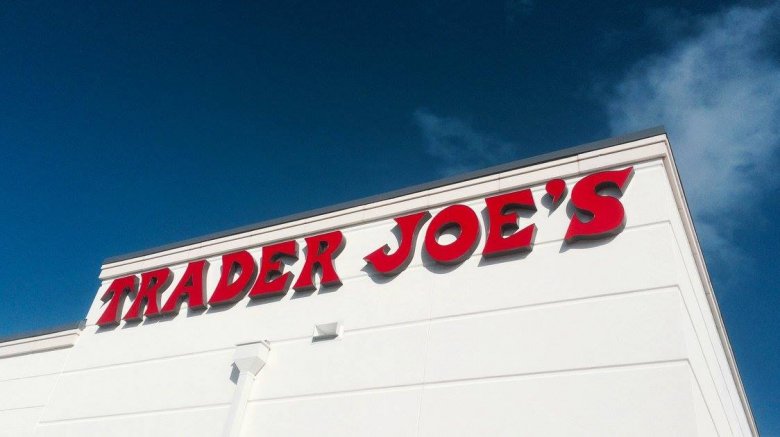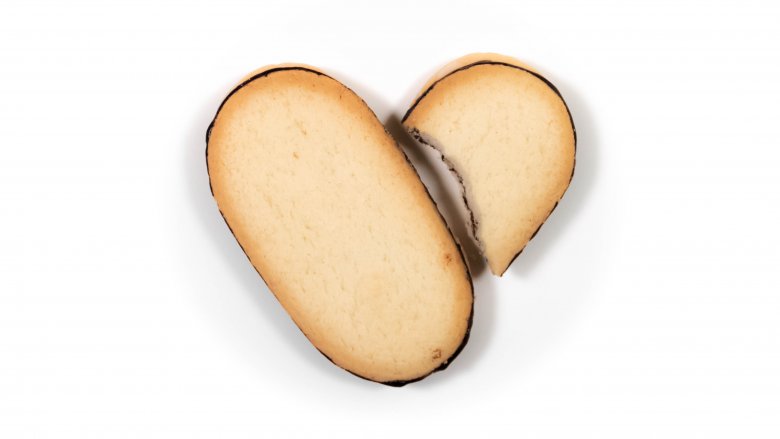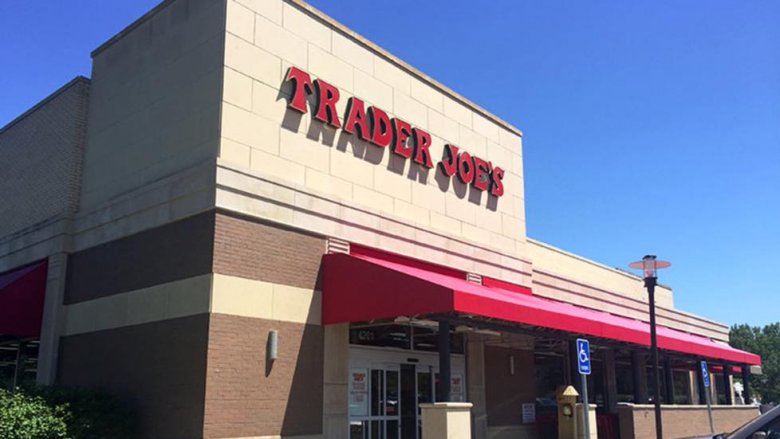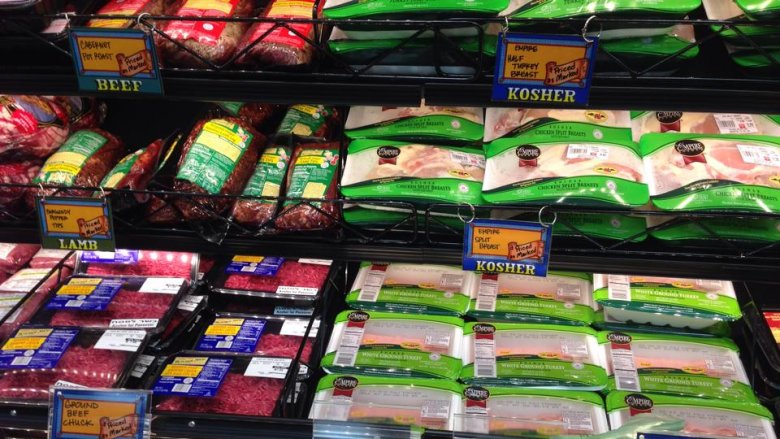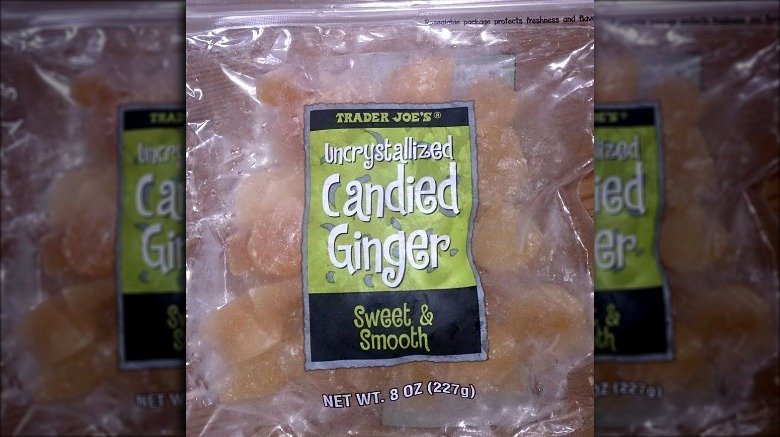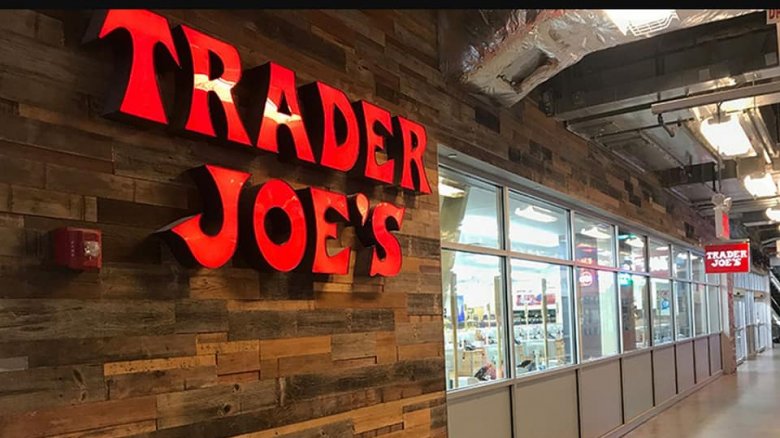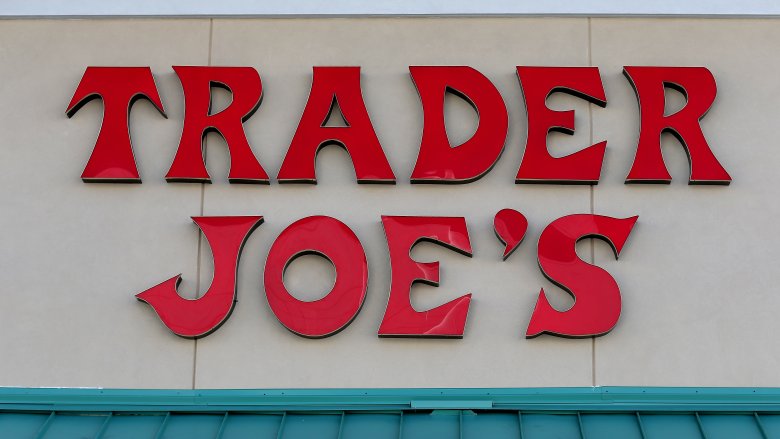Huge Scandals That Completely Rocked Trader Joe's
We may receive a commission on purchases made from links.
Trader Joe's has somewhat of a glittering rep. People love it for cheap wine, novelty frozen items, and the endless plethora of trail mix combinations. Did we mention cheap wine? The chain's famous "Two Buck Chuck" made by Charles Shaw is a staple on most poor twentysomething's grocery lists. And if you can survive the madness of the parking lot, Trader Joe's is typically a very pleasant shopping experience, both for the prices and the friendly customer service.
It's not without its fair share of scandals, though. The California-based chain has had plenty of success since its beginnings as a humble bodega in Pasadena, and has exploded in size and revenue since its inception. Of course, it's arguable that the more successful a company becomes, the more potential it has to be put under a microscope by the public. Here are some of the biggest controversies Trader Joe's has faced since it became the cool kid on the block of grocery stores.
They got called out for using too much plastic
Plastic has become a bad word. From bags to straws, certain types of it are getting straight-up banned in certain areas in order to reduce the massive amount that goes unrecycled. As awareness around the importance of using less plastic grows, consumers are starting to hold their favorite merchants accountable. According to SF Gate, San Francisco residents have voiced their concern about Trader Joe's excessive plastic use, and many have even said they'd stopped shopping at the chain they used to love because of how much plastic it uses in packaging. One former weekly shopper said she hadn't been to the store in six years, all because of the those unrecyclable plastic clamshells.
The word of Trader Joe's egregious plastic use continued to spread, and by December 2018 a petition created on Change.org urging the company to take action had garnered over 113,000 signatures (as of May 2019).
Trader Joe's insists on its website that it's doing everything it can to save the planet when packaging its products saying, "Balancing the need to maintain product quality and safety, when packaging is necessary, we make an effort to pursue recyclable/recycled materials. We also continue to remove products from packaging, where it makes sense. More than 50 percent of the produce sold (in units) in our stores is without packaging." No doubt the heat it's getting from consumers will create a need to do even more in the name of reducing its carbon footprint.
A manager was killed during a hostage standoff
In July 2018 a horrible tragedy occurred at a Trader Joe's in the Silver Lake neighborhood of Los Angeles when the grocery store known for its cheap prices and friendly employees became the scene of a serious crime. A man who'd been on the run from the police ended up at the store, after crashing the car he'd been driving in the parking lot. He'd shot his grandmother and sister in a different location earlier that day. He was allegedly shooting toward the police behind him as he entered the store, where he proceeded to hold everyone in it hostage. While he eventually surrendered to hostage negotiators and most of the shoppers escaped the store unscathed, a Trader Joe's assistant manager named Melyda Corado ended up dead.
Perhaps the most tragic part of this story is that the gunshot that killed Corado actually came from the police, not the gunman they were pursuing. It was an accidental consequence of their stand-off with the gunman. A spokesperson from Trader Joe's stated, "We remain heartbroken over the tragic death of Melyda Corado and the trauma our crew members and customers have suffered." While the incident was clearly no fault of Trader Joe's, it's not exactly great press to have a hostage situation in your store that ends with a dead employee.
A quasi-famous actor got shamed for working there
A New Jersey woman photographed former Cosby Show star Geoffrey Owens working at a Trader Joe's, and, because the internet is very predictable, the images went viral. After she shared them with the Daily Mail, Fox News picked up the story, seemingly shaming Owens for his position. The shopper had expressed shock to see an actor from an iconic TV show working as a cashier, also mentioning how it was surprising to see him "looking the way he did," and the press essentially translated this to "look how sad it is someone from a hit TV show is now working at a grocery store." Big wigs in the entertainment industry — many of them famous actors and producers — then shamed Fox for implying there was anything wrong with an actor having a side hustle between gigs. It even spawned the hashtag #ActorsWithDayJobs in support of Owens.
So, just to recap, Fox essentially shamed the actor, then powerful public figures like Seth MacFarlane and Terry Crews shamed Fox. What made Trader Joe's look bad in this whole debacle, through no fault of their own, was the inference that there was something lowly about working there. The incident ended up catapulting Owens' career, even though he insists he'd been steadily working as an actor but had taken the TJ's job to help cover bills. Luckily for Trader Joe's, the majority of people supported Owens and an honest day's work, even if it's acting one day and stocking shelves the next.
The secret got out about who really supplies the store brand favorites
Ever wonder what the secret is behind some of your most beloved Trader Joe's brand snacks? It's that they're actually other brands undercover. According to Mark Gardiner, author of the book, Build a Brand Like Trader Joe's, that's one of the stores most game-changing tactics: Build up customer loyalty for products they don't actually even make, and be very hush-hush about who makes them.
To get to the bottom of this and other secrets, Gardiner actually worked as a crew member at Trader Joe's to investigate their strategies. He told Eater, "Suppliers aren't allowed to say they supply Trader Joe's products, and Trader Joe's never willingly talks about who their suppliers are." It's scandalous because one of Trader Joe's selling points for its loyalists is the sense that they're getting something unique and supporting a local grocer. The report from Eater deduces, for example, that Trader Joe's Sea-Salt Pita Chips are actually Stacy's Pita Chips, which Frito-Lay owns. Oh, and Frito-Lay is owned by Pepsi-Co. So while consumers think they're not supporting a corporate giant by buying private label items, in actuality, they might be. Supposedly the easiest way to tell if it's a widely known brand moonlighting as the TJ's brand is checking the ingredients and making a note of FDA recalls.
These items might still be cheaper at Trader Joe's but knowing this insider secret does rob you of some of that TJ's joy a little bit, doesn't it?
Crew members accused managers of unfair labor practices
Just because the crew at Trader Joe's always seems overly upbeat doesn't mean they actually are. In fact, one East Coast TJ's employee claimed he was unfairly fired due to not being "genuine" enough with his friendly demeanor, and subsequently filed a charge for unfair labor practices in 2016. The former worker, Thomas Nagle, said in his complaint that working conditions at Trader Joe's were, essentially, not conducive for smiling. Nagle cited disrespect from managers at his store and overpowering smells in the stockrooms. After Nagle's filing, apparently other TJ's employees across the country agreed with his complaints and said they had similar experiences. Some Trader Joe's bulletins require that employees maintain a "positive attitude" but labor experts who agree with Nagle claim that such a requirement is illegal.
While Trader Joe's insisted it would never fire someone for "trivial reasons," Nagle insisted that the expectation the managers put on his demeanor was unrealistic, especially considering the less than ideal working environment and how they were treating him. It's definitely not great press when insiders at a company whose rep is being friendly and approachable reveal that appearances are not always what they seem.
Pepperidge Farms sued them for trademark infringement
Ever heard the saying, "Don't mess with Pepperidge"? Probably not because we just made it up, but we still stand by it. In 2015, the brand known for its sweet treats and savory snacks sued Trader Joe's for selling an item that was eerily similar in appearance to its infamous Milano cookie. In the complaint, Pepperidge Farms alleged that Trader Joe's Crispy Cookies were so similar to its Milano cookies that it was creating customer confusion. While the Milano cookies have round edges and the TJ's version had more rectangular ones, Pepperidge Farms still claimed they were copying the shape. It insisted that Trader Joe's stop selling the cookies.
The case was dismissed and the two mega brands apparently resolved their issues behind closed doors. We can't say we really blame Pepperidge Farms for getting feisty with Trader Joe's — when you made a dessert that delicious, you better make sure nobody else is trying to take credit for it.
Their plans to build were rejected by locals who didn't want gentrification
In 2014, a Portland neighborhood where Trader Joe's wanted to build a store made like Amy Winehouse and said, "No, no, no." The residents of this predominantly black neighborhood were concerned that the arrival of a Trader Joe's on their block would further amplify the gentrification that was already pricing out longtime community members. Activists in the area pushed back when the Portland Development Commission gave TJ's the go-ahead because they insisted it would attract a higher income population that would give landlords incentive to raise rents, which would in turn force the current residents out of the area. Instead, the opposers said they wanted affordable housing in the empty lot Trader Joe's had its eye on.
Trader Joe's backed down in the face of the resistance, claiming it didn't want to set up shop as a "neighborhood store" that the neighborhood didn't want. Regardless of one's stance on the reality of gentrification, it might not have looked good to outsiders when the popular chain was accused of causing more harm than good to a neighborhood inhabited by a minority group with a history of oppression in this country.
They were called out for selling meat with antibiotics
While Trader Joe's might be well reputed for its wide selection of meats that do no contain antibiotics, those antibiotic-free offerings aren't the only meat on the shelves. Consumer Union, an advocacy group affiliated with Consumer Reports, ran a full-page ad in the Los Angeles Times in 2013, urging the company to stop selling any meat sourced from animals that had been given antibiotics. The group insisted that Trader Joe's become an "industry leader" by refusing to sell any product with antibiotics that, they said, could ultimately impact our health in a negative way.
Trader Joe's responded by saying it would "continue to develop new sources to support new product offerings with the antibiotic-free attribute." While it's true that Trader Joe's never claimed that it only sold antibiotic-free meat, this advertisement certainly served as a public reminder that the chain isn't immune to the pressures of sustainable, non-harmful food sourcing.
They were sued for selling food with high levels of lead
California does not mess around with food labeling. The state's Proposition 65 declares that merchants have to reveal any harmful toxins that might be in the products they're selling. So when the California Attorney General slapped Trader Joe's and 11 other businesses with a lawsuit that purported they were selling a plum and ginger candy with lead in it, they took some serious heat, and what's worse, Trader Joe's did not immediately remove the Uncrystallized Candied Ginger in question from its stores. The candy allegedly containing not-naturally-occurring levels of lead were especially risky for children and pregnant women. For expectant mothers in particular, the lead can cause significant harm to the unborn fetus as it develops. What's worse, when a woman is showing signs of high lead levels in her system, there isn't an established protocol for treating it.
While lead and other chemicals can be naturally occurring in some foods, it's the added dose that consumers should be wary of. But natural or not, "Oh yeah, that ginger candy you love at Trader Joe's might have excessive amounts of lead in it" is not exactly a statement that's going to have moms and pregnant ladies running to stock their pantries with TJ's provisions any time soon.
A popular food blogger alleged they were lying about GMOs
Trader Joe's claims it doesn't allow genetically modified organisms (GMOs) in any of its private-label products, but popular food blogger Vani Hari, aka the Food Babe (and noted alarmist), begs to differ. Hari requested some information from the company — namely the affidavits it allegedly has that confirm third party vendors aren't using GMOs — and she says they refused to show them to her. Hari insists that while Trader Joe's may claim certain things are non-GMO, there's no way of proving it.
Hari reached out to the Non-GMO Project, who seemingly validated her concerns. Non-GMO's executive director said, "To date, it has been very difficult to ascertain the credibility of their non-GMO claims. We know that many consumers believe Trader Joe's to be a GMO-free store, but without transparent standards or third-party verification this is impossible to confirm."
Though the company didn't respond directly to Hari's claims, they did respond to another blogger asking similar questions, saying, "In regards to GMO sourced ingredients, our approach to Genetically Modified Organisms is simple: we do not allow GMO ingredients in our private label products (anything with Trader Joe's, Jose's, Ming's, etc. on the label)."
The Food Babe's hunch is that Trader Joe's secrecy means they don't thoroughly check that everything is, in fact, GMO-free. She claims the lack of transparency around the sources is very suspicious, and put them on blast in her blog, which has been shared 228,000 times on Facebook (as of May 2019). It's not great publicity for a company that everyone assumes is "healthy" and honest.
Social justice advocates demanded they sign a Fair Food Agreement in a very public way
When citizens belonging to the Coalition of Immokalee Workers (CIW) showed up at the Trader Joe's headquarters in 2011, it certainly wasn't the chain's finest hour. The 400 advocates for migrant tomato pickers arrived with religious leaders and two letters, each signed by a group of rabbis and a group of pastors. The letters insisted Trader Joe's monitor labor violations in the tomato fields of its suppliers. The CIW and its God-fearing allies wanted the chain to sign a Fair Food Agreement that would promise the workers an additional one cent per pound of tomatoes picked. It also asked Trader Joe's to make sure growers maintained certain fair labor practices in the field.
What made Trader Joe's looks so shady in this situation was that it wouldn't accept the letters. The security guard at its headquarters not only kept the doors locked but also insisted he wasn't even privy to the names of the TJ's VIPs who should see the correspondence. Prepare to cringe because it gets worse... A religious leader who was at the scene says the police were called, and as the cops shuffled them away, she saw a rep from Trader Joe's exit the building, rip the letters off the glass where they'd posted them, and trash the papers. At least wait until the social justice group has left the premises before you destroy their efforts, Trader Joe's.
For what it's worth, a company VP did say that these events were "miscategorized for effect," and that he planned to call one of the pastors to discuss the situation.
